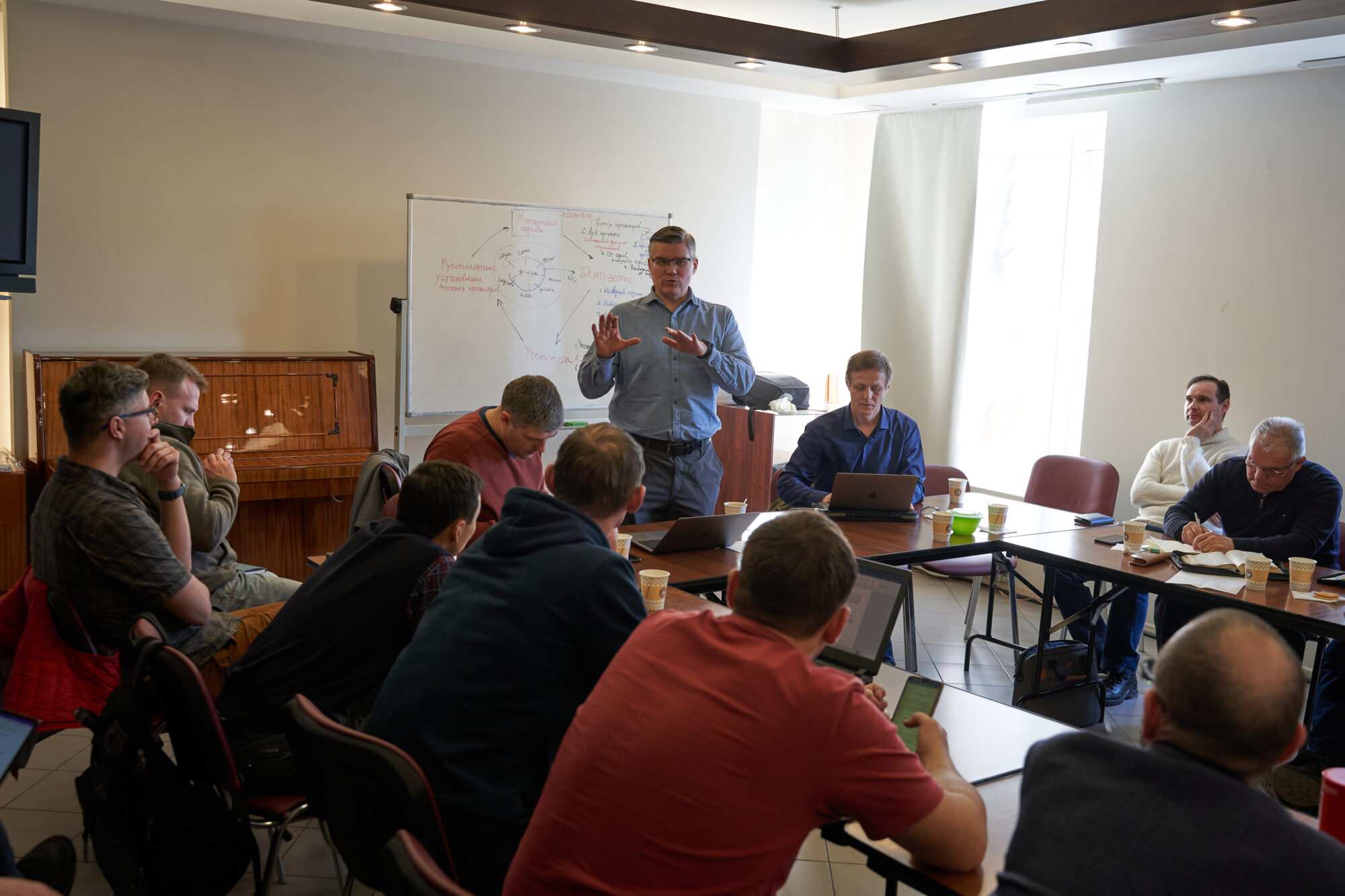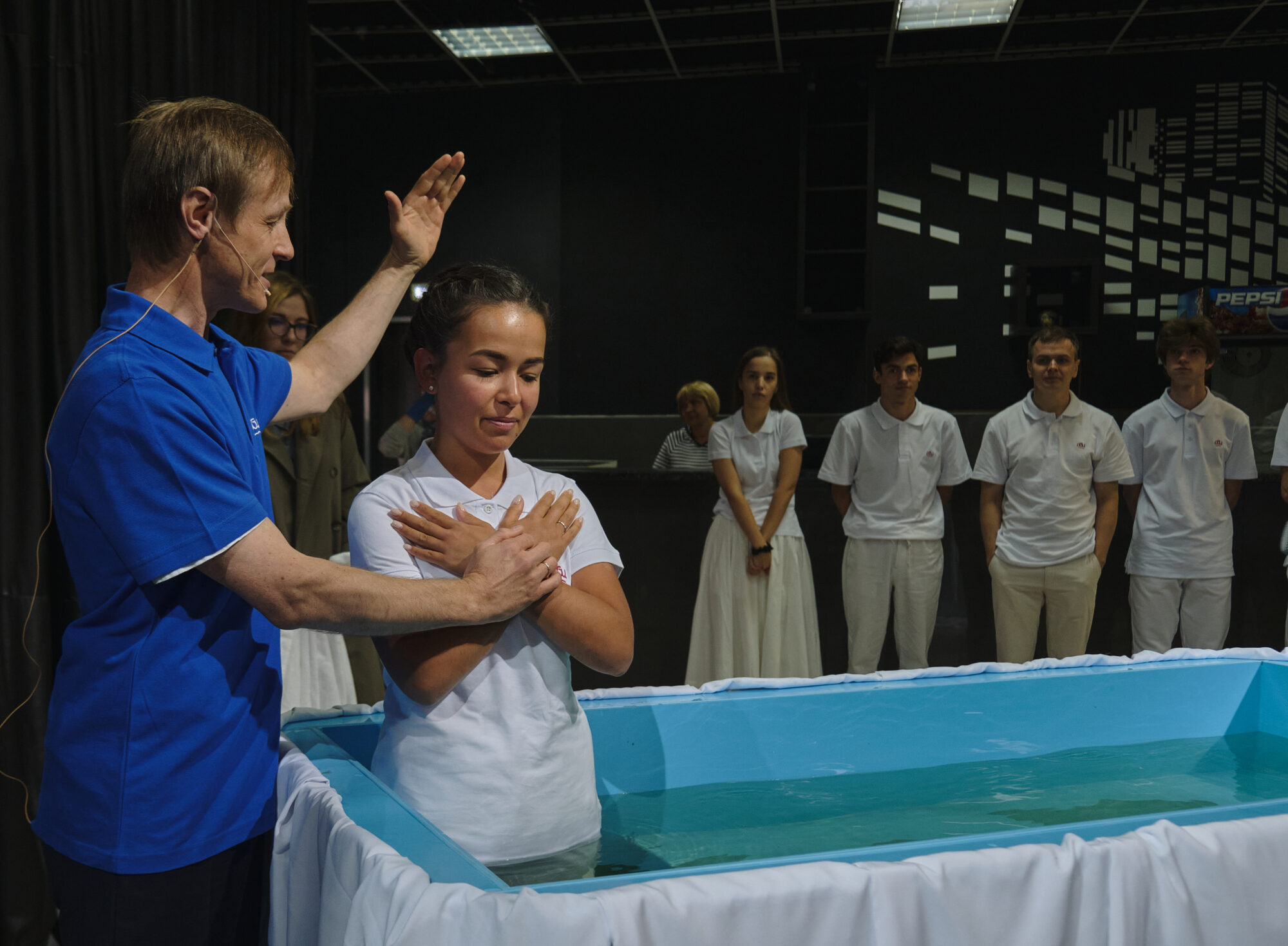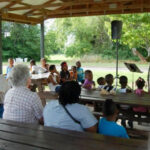The first week after Russia began “special military operations” in Ukraine, Russian pastor Evgeny Bakhmutsky couldn’t sleep.
“The first week, I was crying every day in my prayers,” he said. “If I could go to the Kremlin or the Red Square and do anything to stop it, I would. . . . I know God is going to judge us all. I saw so many suffering and confused people. I wondered what was going to happen. It was really difficult.”

He was also on the phone constantly. Some Ukrainians in the conflict zones could only escape through Russia. “We had dozens of people, especially in the beginning,” said Bakhmutsky, who lives in Moscow. “Some were asking us to help them to stay in Russia. Many of them we helped get to Europe. We were buying them tickets or driving them to the Russian border and giving them some money.”
It’s been one year since then—“the hardest year of my ministry,” Bakhmutsky said. On top of anxiety and helping refugees, he’s felt pressure from the surrounding society, hate from people both outside and inside Russia, financial strain, and the stress of a large congregation whose members were all affected differently by the events taking place.
But he can also “clearly see God’s hand.” Over the past 12 months, new opportunities for ministry have opened. People have come to faith. And his church is drawing hundreds of visitors.
“People are much more open to talk” about spiritual things, he said. “At the same time, Christians themselves are much more active in evangelizing, in feeling that’s the only thing that ultimately matters. I see many churches doing really well even when facing difficulties. . . . They are encouraged.”
Heartbreak
Even though Russia had been mobilizing troops for months, the actual invasion caught many off guard—even those in Moscow.
“We thought this could not happen,” Bakhmutsky said. “We have some families who were very much connected with Ukraine.” He’s one of them—his grandfather grew up in the region of Bakhmut, a Ukrainian city that Russia’s been shelling since May.
This isn’t an impersonal war, fought through arms deals on the other side of the world. The Russian and Ukrainian cultures were close, and the evangelical Christians—a decided minority in each country—were even closer. Ukrainian and Russian church leaders held conferences together, swapped pulpits, and shared theological resources. The two were so close that if a theological resource was available in Russian, barely anybody bothered to do a separate Ukrainian translation.
So when the invasion came, the cuts were deep.
“My soul grieves, my heart breaks with horror and shame, and my mind is shocked by human folly,” Bakhmutsky posted to Facebook the day of the invasion. “Today I cry and pray together with my brothers and sisters in Ukraine, sharing their pain and horror!”
Helping Refugees
Since the conflict began, nearly 3 million Ukrainians have crossed the border into Russia.
“For many of them, that was the only way to go,” Bakhmutsky said. Almost as soon as the invasion started, his phone began to ring with people looking for help.

He lives near a major railway station in Moscow, but that isn’t the only reason Ukrainian refugees were turning to him. In 2009, he planted a church that grew to one of the largest in Moscow—from 17 attendees to 500 in 2019. Along the way, his Russian Bible Church started a network of church-planting and church-revitalizing pastors, which has grown from 32 pastors to more than 100. About 300 churches participate in Ekklesia’s programs and events.
In addition, the Russian Bible Church has joined other evangelical churches (many of them part of Ekklesia) in outreach along the Russian-Ukrainian border, including in Crimea, which was seized by Russia in 2014.
“So we have multiple connections when people are thinking about Moscow,” said Bakhmutsky, who has also spoken and written in Christian forums around the world. “It was challenging because there were limitations on foreign currency like U.S. dollars.”
Two days after the invasion, the European Union, United Kingdom, Canada, and the United States cut off transactions with Russia’s banks. As resources began to run low, Bakhmutsky said, “It has become almost impossible to provide financial aid directly.”
Still, the members of Russian Bible Church kept going. They helped hundreds of Ukrainian refugees—some to find a place in Russia, others to escape to countries like Poland, Germany, Serbia, or Turkey. They provided beds, clothing, food, and transportation.
Ever since, Bakhmutsky said, “We have around 50 people from our church who have been constantly ministering to refugees here.”
Becoming Refugees
Some members of the Russian Bible Church, especially those with Ukrainian roots, “could not stay in Russia,” Bakhmutsky said. “For some, it became too much. They felt they were affiliating themselves too much with this tragedy.”
Bakhmutsky talked to his congregation. “If you want to leave,” he told them, “you may leave. I know it’s morally hard and financially difficult to stay. Just don’t leave in a rush. Let your pastors know and we will help you, and help to find a good church for you in a good location.”

By the end of the summer, the churn from refugees arriving and people leaving had mostly died down.
And then president Vladimir Putin announced the drafting of military reservists—some 300,000 civilian men—into active military roles.
“September was really difficult because hundreds of churches and thousands of people were confused—they didn’t know how to respond in a Christian way,” Bakhmutsky said. Do you obey your government and enlist? Do you wait and hope you don’t get called up? Or do you run before the army can tap you?
“I could clearly see God’s hand, because our annual pastor’s conference was moved by one week,” landing just days after the mobilization was announced, he said.
“Many men came, and we had such amazing fellowship,” he said. “We prayed for Ukraine and prayed for each other. We strengthened each other’s hearts and hands. More than 500 pastors from different parts of Russia went home with encouragement, good networking, and a clear message to continue gospel ministry in spite of everything.”

They went home to smaller churches. Within the first 12 days of Putin’s announcement, about 400,000 Russians left the country, according to border officials.
About 25 were men from Russian Bible Church. While most have returned, the absence of some husbands and fathers means there are fewer men to lead or volunteer, and more fatherless families to care for.
“I have been praying that God will strengthen my heart and the other leaders,” Bakhmutsky said. “It’s really difficult for women especially. Quite often the heaviest part is laid down on the shoulders of women, so we started regular zooming meetings. In March we’ll have a women’s conference to encourage them and help them.”
Bakhmutsky, who has many friends and connections in other countries, is often asked why he hasn’t left Moscow.
“How could I do that?” he asks. “There is such a spiritual darkness. We need to be here. . . . I said to my congregation, ‘I will not leave you. If you move, I will be the last one to go.’”
Staying
It’s not easy to stay. Putin’s war has been an economic nightmare, as Western companies pulled out and Western sanctions kicked in.
“Our family budget is down 50 percent,” Bakhmutsky said. It’s hard for them to get his wife’s medication from the United States. And platforms like Zoom or Microsoft Office will no longer take his Russian credit card. “We’re disconnected from so many normal things,” he said.
He’s also a target.

“I get hate comments every day,” he said. Furious and scared, Ukrainian Christians have blasted him for not doing more to publicly condemn Russia’s actions, for choosing to stay in Moscow, even for being Russian. “But I don’t condemn people for that. And in many ways I understand their reaction. My prayer is for them. And I pray to God that they allow me to cry with them. I love them. And I have compassion for them with all my heart.”
Even mercy ministries are like landmines. Do you support the Russian mother whose husband is fighting in the army? Do you help those who are hurting in Russian-occupied territories of Ukraine, or does that appear to sanction the war effort? Do you tell the men in your church to flee the country to avoid conscription into the army?
“I try to be wise in my words,” said Bakhmutsky, who has stopped reading social media. “I encourage people to consider how they can act as Christians. And that has helped.”
He knows the Russian government is also listening to his words, alert for anyone discrediting the army or the operation in Ukraine. He’s not afraid to go to jail—both his grandfathers were exiled to Siberia for their faith—but he wants it to be for his faith, not because he was reckless.
As long as he’s free, he’s got plenty to do.
Growing
Bakhmutsky reread much of Dietrich Bonhoeffer over the past year, agreeing with the Barmen Declaration that “the best answer to totalitarianism is preaching Christ.”
“This is what I see right now,” he said. “When we preach Christ, we aren’t escaping or denying or assimilating reality. We are bringing Christ to the reality. The gospel will give hope, strengthen hearts, and bring true repentance.”

It also gives him a sure path forward in a church that includes civil servants, people who don’t support the government’s actions, relatives with different political views, women whose relatives are fighting in the army, women whose husbands fled the country, and probably secret agents.
“Conflicts within the church have been very painful,” he said. “It’s probably the most painful thing to see the brothers and sisters who love and minister with each other start to lose each other.” He understands why—it’s “natural for people judge everything through their own context and conscience”—but that doesn’t make it easier.
He just keeps pointing to Jesus. And some of Russian Bible Church’s 400 members have reexamined or reembraced their faith this year, Bakhmutsky said. “Our church services have never been so joyful.”
They’ve also never been so crowded.

“Our church building can accommodate 700 people, and it is always packed,” he said. “Sometimes we have two times more new visitors than members. We see more people coming to faith. We do more baptisms than we used to. . . . Many young men are coming to faith because they understand they could die. There is no stability, and people are asking themselves, Why am I living on this planet?”
He’s hearing similar stories from other pastors in his network.
“Even when facing difficulty with mobilization, immigration, and economic pressure, churches are encouraged,” he said. About 200 people are preparing to join Russian Bible Church, which is almost more than they can handle. Bakhmutsky is searching for a larger space and planning a Moscow church plant at the same time.
“I see the power of the gospel much more than before,” he said. “I see a really good future.”
Christians First
Less than two months after Russia invaded Ukraine, Mark Dever and Ligon Duncan hosted the last Together for the Gospel conference. Staff from John Piper’s Desiring God asked Bakhmutsky if he was coming.
“I’m not planning on it,” Bakhmutsky told them.
They bought him a plane ticket.
“It was so helpful to see Sinclair Ferguson, Mark Dever, Alistair Begg, Kevin DeYoung, David Platt, and John Piper,” Bakhmutsky said. When they sat down together, Bakhmutsky told them, “Yes, I am Russian. But I am more Christian than Russian.”
I am more Christian than Russian.
“We are more Christian than American,” they replied.
“I needed to hear that then,” he said. “When you get so much hate speech and so much pressure in your new reality, you need to get some encouragement because you can feel alone, abandoned, and neglected.”
He holds on to that encouragement and to Bible verses such as Matthew 24:14, Philippians 1:21, Philippians 1:29, and Isaiah 40. Because Bakhmutsky expects things in Russia will get worse before they get better.
“We are going to suffer much more than we expect, but we are going to be agents of God’s grace and mercy,” he tells his congregation.
He’s determined because he’s hopeful.
“My whole life, I have been praying for the spiritual awakening of Russia,” he said. “[For that to happen], human pride first needs to be crushed. Right now, I am more encouraged than ever that I might see that in my lifetime.”
In 2022, TGC launched websites in Ukrainian and in Russian to support Christians there. Read TGC’s report on what God has been doing in Ukraine.
Share gospel-centered resources with the global church
It is our prayer that God will increase the reach and the impact of TGC’s international work to provide trusted and timely, winsome and wise, gospel–centered resources to the global church. Will you join us in this mission? Your gift will be a great encouragement to the afflicted church across the world.
Click the button below to support the global Church
Donate Today »
































